Home » Archives for June 2013
Woman told to lift bra at traffic stop
Posted by Unknown
Locklear talks Jane Seymour kiss
Posted by Unknown
Obama is right on climate change
Posted by Unknown
Editor's note: Chris Field is the director of the Department of Global Ecology of the Carnegie Institution for Science and co-chair of a working group tasked with assessing climate change impacts, adaptation, and vulnerability for the Intergovernmental Panel on Climate Change (IPCC).
(CNN) -- The goals President Barack Obama set out Tuesday in his Climate Action Plan -- including cutting pollution from coal plants and aggressively pursuing clean energy alternatives -- won't solve all the challenges of climate change, but they are a big first step in protecting the planet from its worst effects. Getting serious about solutions is critically important, especially now and especially for the United States.
Why the rush? Climate change is driven by emissions of a range of heat-trapping gases, especially the total emissions of carbon dioxide, which have been pumping out since the beginning of the Industrial Revolution. How much? Through 2012, that total is about 1,700 billion tons of carbon dioxide from fossil fuel combustion and cutting down forests. In 2012, carbon dioxide emissions in the U.S. were 19.4 tons per person or about 750 pounds per person per week.
Per capita carbon dioxide emissions in the U.S. may be lower now than they were in 1990, but the average American still emits three times the global average. Global annual carbon dioxide emissions continue to grow rapidly, with emissions in 2012 more than 50% above 1990 levels.
Recently, and for the first time in more than 2 million years, the concentration of carbon dioxide in the atmosphere climbed above 400 parts per million, 37% higher than in 1800. The resulting global warming, about 1.5 degrees Fahrenheit, will persist for at least 1,000 years.
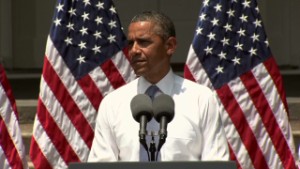 Obama plans 'assault' on climate change
Obama plans 'assault' on climate change  Skeptical environmentalist & a scientist
Skeptical environmentalist & a scientist  Global warming brings on more pollen
Global warming brings on more pollen With every passing year, the pool of total carbon dioxide emissions grows bigger, causing more warming -- and more warming leads to greater damages from climate, weather extremes like heat waves, heavy rainfall, and coastal storm surge, as well as altered crop yields, threats to human health, and increased risks of wildfire.
The first step? Address the root of the issue, and this is why the action Obama outlined is smart. The plan recognizes the breadth of the problem and focuses on a wide range of emissions sources. It also recognizes that not all the damages can be avoided and that building resilience needs to be a part of the package.
Taking action now is also cost-effective. Slowing and eventually stopping emissions will take time. The global energy system producing most of the carbon dioxide emissions is massive, and includes thousands of power plants and more than a billion vehicles. The components of the energy system are long-lasting: Cars are driven for one to two decades. Power plants are designed to run for up to a half-century. Buildings, which use energy for heating, cooling, lighting, and running equipment, can stand for a century or more.
As things stand now, these realities commit us to continuing emissions into the future. Each new coal-fired power plant that goes online or inefficient vehicle that hits the road extends that commitment. In principle, we can retire existing infrastructure -- like energy-inefficient buildings and carbon-intensive power plants -- early, but such a rapid transformation of an entire energy system would be exorbitantly expensive, essentially because it involves scrapping equipment that has not lived out its useful life.
Building the energy system for the 21st century ambitiously but gradually, starting now, controls the costs by building for the long run and by enabling markets to innovate and drive down costs.
Why is U.S. leadership so important? First, the United States has the necessary skills in science and technology, the tradition of innovation, and the mature capital markets to boldly seize opportunities. Building the energy system of the 21st century is perhaps the greatest business opportunity of the era. It will involve a wide range of technologies that emit little or no carbon dioxide, with greatly increased energy efficiency in vehicles, buildings, and equipment.
Second, the U.S. is the only nation that can truly focus the world's attention on the climate problem. When the U.S. hangs back, it is easy for other countries to question goals or get tangled in internal politics.
U.S. leadership is critical in supercharging the international effort. Today is the day to start.
Follow @CNNOpinion on Twitter
Join us at Facebook/CNNOpinion
Windsor: My DOMA suit ends in joy
Posted by Unknown
Editor's note: Edith Windsor was the plaintiff in the Supreme Court case challenging the Defense of Marriage Act.
(CNN) -- On Sunday, I will have the honor of serving as grand marshal in the New York City Pride Parade. I have marched in the parade for the last several years carrying a huge rainbow flag. Last year, I was so elated that I danced my way down the street for the entire route.
Before that, my late wife Thea and I, she in her wheelchair, would watch the parade together every year. If someone had told me 50 years ago that I would be the marshal of the New York City Gay Pride Parade in 2013 at the age of 84, I never would have believed it.
Over the past couple of years, many people have asked me, "Why did you decide to sue the United States over a tax bill?" Because the answer is complex, let me give you some of the background.
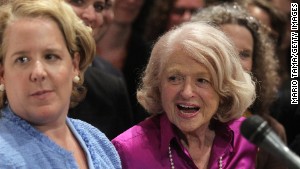 Edie Windsor, right, talks to the press with her attorney Roberta Kaplan after the Supreme Court ruled against DOMA.
Edie Windsor, right, talks to the press with her attorney Roberta Kaplan after the Supreme Court ruled against DOMA. I lived with and loved my late spouse, Thea Spyer, for more than four decades in love and joy, and in sickness and health, until death did us part. When Thea died in 2009 from a heart condition two years after we were finally married, I was heartbroken.
On a deeply personal level, I felt distressed and anguished that in the eyes of my own government, the woman I had loved and cared for and shared my life with was not my legal spouse, but was considered to be a stranger with no relationship to me.
On a practical level, because of the so-called Defense of Marriage Act, or DOMA, I was taxed $363,000 in federal estate tax that I would not have had to pay if I had been married to a man named Theo instead of a woman named Thea. Even if I had just met Theo, married him and never even lived with him before he died, the tax would have been zero. So, overwhelmed with a sense of injustice and unfairness, I decided to file a lawsuit to get my money back.
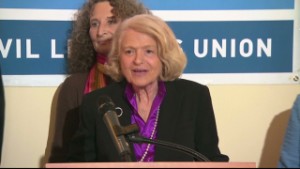 Windsor: We won everything we asked for
Windsor: We won everything we asked for  Did Supreme Court make history or not?
Did Supreme Court make history or not?  Watch the best moments from gay day
Watch the best moments from gay day I lucked out when Robbie Kaplan, a litigation partner at the law firm of Paul Weiss, walked into my life. At a time when the gay organizations that I approached responded with, "It's the wrong time for the movement," Robbie Kaplan said -- as did the Rev. Martin Luther King Jr. before her -- "There is no wrong time" to seek justice. She answered my plea, and took me on.
Robbie argued my case in the Supreme Court on March 27 this year. When she argued against DOMA, she was cool and calm and informed and reasoned -- all of which was sustained by her deeply felt passion for equality in all of our lives. And we WON -- all the way.
I have been so honored and humbled to represent not only the thousands of Americans whose lives have been adversely impacted by DOMA, but those whose hopes and dreams have been constricted by that same discriminatory law.
Because of the historic Supreme Court ruling in my case, the federal government can no longer discriminate against the marriages of gay and lesbian Americans. Children born today will grow up in a world without DOMA. And those same children who happen to be gay will be free to love and get married -- as Thea and I did -- but with the same federal benefits, protections and dignity as everyone else.
To all the gay people and their supporters who have cheered me on, thank you. I'm sure that Thea is thanking you, too.
Not only does a much larger portion of the "straight" world see us differently -- as just people who live and love and play with their kids -- but also our own community has come out and seen each other, and loved each other, in a way that makes me courageous and proud and joyous every day.
If I had to survive Thea, what a glorious way to do it.
Follow @CNNOpinion on Twitter.
Join us at Facebook/CNNOpinion.
Greene: Living like a sultan at sea
Posted by Unknown
Editor's note: CNN Contributor Bob Greene is a bestselling author whose 25 books include "Late Edition: A Love Story"; "Once Upon a Town: The Miracle of the North Platte Canteen"; and "When We Get to Surf City: A Journey Through America in Pursuit of Rock and Roll, Friendship, and Dreams."
(CNN) -- The cruise-line industry is a rough business.
Every time a passenger ship leaves port with a guest cabin unoccupied, that's money the cruise operators are never going to see.
Last week Micky Arison, the longtime chief executive of Carnival Corp., announced that he will be stepping down; revenues at the world's largest cruise-ship line have been falling. Arison will remain as chairman of the firm, but a new CEO will step in.
 Bob Greene
Bob Greene Cruise companies have always had to contend with uncertainties in the economy, which sometimes make travelers cautious about planning leisure trips, and Carnival has faced widespread unpleasant publicity in recent years. The Costa Concordia, owned by a subsidiary of the corporation, ran aground and partially sank off the coast of Italy in 2012, killing 32 people. This year the Carnival Triumph lost power in the Gulf of Mexico after a fire in the engine room, creating distressing conditions onboard for its more than 3,000 passengers.
The very nature of the cruise business -- the relentless competition between various lines, the need to fill those staterooms, a fickle public with a multiplicity of options for how and where to vacation -- might cause sleepless nights for executives, but for certain people, it provides a dream scenario:
A seldom-considered way to live the ultimate beach-bum fantasy, 21st-century style.
It's not for everyone. You need to, at least temporarily, have unlimited time on your hands, and you need to have saved, or come upon, some money that you won't one day regret using up this way.
He was eating gourmet meals, lounging in the sun, going to stage shows at night, sleeping in freshly made-up beds with the oceans of the world lulling him to sleep.Bob Greene
And a desire, at least once during your time on Earth, to live your life as if it's a Jimmy Buffett song.
A few years back, I was on a cruise ship after a week at sea with the Surf City Allstars, the band with whom I occasionally travel and sing. Most of the passengers, on that final morning, were harried and tense about gathering up all their baggage and making the jarring reentry to the mundane real world. The fun was over.
But in a lounge area of the ship, one man sat near us as he waited for his debarkation group to be called. He seemed as serene and calmly blissful as if he was just getting ready to start a cruise, not end one.
That's because he was.
The way he explained it to us, he had parted company with the corporation that employed him; we got the impression that this was not voluntary on his part. He had been given some severance.
So, he told us, he had figured out a way, for a relatively small amount of money, to live, for a while, like a king. Like a sultan at sea.
He was now, he said, residing virtually full-time on cruise ships -- eating gourmet meals, lounging in the sun, listening to music and going to stage shows at night, sleeping in freshly made-up beds with the oceans of the world lulling him to sleep.
How could he do this?
Each week, he explained, he'd get on his computer and do searches for cheap, last-minute cruise deals. There are websites that specialize in exactly that.
He was counting on the need of all those cruise lines to fill every cabin -- he was counting on their willingness to do just about anything to get rid of their inventory (the unoccupied rooms) as their ships were about to sail.
He said that, by waiting until the last minute, and by not particularly caring where the ship with the best bargain was heading, he was able to find astonishing rates. The ship upon which we were talking had been sailing the Caribbean for a week. I believe he told us that the seven-day cruise, with all meals included, had cost him, as the clock ticked down and the rock-bottom price popped up, a little more than $300.
There is no way, on dry land, that you can eat a week of extravagant multi-course dinners in fine restaurants for $300 -- much less get living quarters, entertainment, recreation and all your other meals, too.
That winter, he said, he'd made the decision to base himself in the Fort Lauderdale, Florida, area, near the massive Port Everglades seaport. Occasionally he would have to pay for a night or two in a budget hotel before the next ship left, but his goal was to get off one ship, wait a few hours, and get right back on another.
And, while at sea, get on the internet and search for the next bargain.
For many people, a cruise is a once-in-a-lifetime treat. He had figured out how to make it his everyday world.
Now. . .there are tradeoffs. You don't get to plan in advance and choose exactly where you want to go. But if you do it every week, do you really care if, on a particular week, one of the ports of call is St. Lucia instead of St. Thomas? The Dominican Republic instead of Costa Rica? It doesn't matter -- for you, it's all travel roulette.
The downside -- and it's a huge one -- is that you are cast adrift in many ways.
Eventually, when your money runs out, you are going to have to think about rejoining the world of ambition and ladder-climbing, and trying to make up for lost time. You have to be the kind of person who can be content with the thought that you are accomplishing and accruing absolutely nothing while other people, back on land, are applying for jobs and working for promotions that will bring them financial security.
You have to be comfortable in the company of complete strangers, who materialize and then disappear week-by-week. You can't be a person with a family who is expecting you at the dinner table back home. And, although you don't have to be trust-fund wealthy, you have to somehow have $400 or $500 a week on hand, for weeks on end.
But the opportunity, for a particular kind of person, is there. The modern-day combination of a vast cruise industry, and an internet that makes finding 11th-hour bargains effortless, means that you can, for as long as you are able to get away with it, indulge yourself in an endless summer, letting rootlessness be a virtue.
Probably very few people reading these words will find themselves in a position, or a frame of mind, to do it, but maybe, the next time the cubicle culture begins to feel too confining, just the thought of it will bring a smile.
On gray days, it has for me. I've thought, from time to time, of that guy on the ship, and wondered how long he was able to make it last. Or whether it became a case of too much ice cream -- if he ended up deciding that the long meal of life was not meant to be an infinite succession of desserts.
And whether a fellow like Micky Arison, the head of Carnival, with all of the job's challenges and headaches, ever daydreams of being that guy instead.
Follow @CNNOpinion on Twitter.
Join us at Facebook/CNNOpinion.
Heather Locklear kisses and tells
Posted by Unknown
Clorox pulls post insulting new dads
Posted by Unknown
Editor's note: CNN's Josh Levs covers a wide range of topics and also offers his personal take on issues affecting fathers and families. He covers fatherhood for HLN's Raising America. Follow him on Twitter and Facebook.
(CNN) -- Just when you think derogatory stereotypes about dads are on the decline as fathers take a more hands-on role in child-rearing, along comes an online posting by a major brand that shows not everyone got the memo.
And this one -- published, then pulled, by Clorox -- charts new terrain in depicting first-time fathers as clueless buffoons.
 Josh Levs
Josh Levs "Saying 'No-no' is not just for baby. Like dogs or other house pets, new dads are filled with good intentions but lacking the judgment and fine motor skills to execute well," it reads.
Somehow, it manages to get even more offensive from there.
The list of "6 mistakes new dads make" begins with a father taking his child for a walk in "a cold, brisk, rain-soaked stroller" and only after 10 minutes beginning to wonder "why is this baby crying so much?" At that point, he notices his child is wearing "a short-sleeved summer onesie."
He's also likely to put his child's clothes on backwards and not understand why they fit wrong.
He lets baby eat off the floor -- so, the web post cautions, "At least get him to enforce a 5-second rule."
He fails to notice the food -- or, worse, Play-Doh -- all over his baby's face, let alone wipe it off.
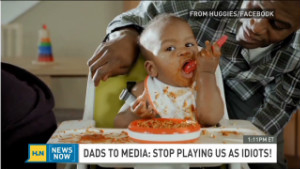 Dads to media: We're not idiots!
Dads to media: We're not idiots! Then he gives his child inappropriate screen time, plopping the baby down in front of "reality shows."
Parental outcry led Clorox to reexamine the wisdom of the post. The company pulled the page from its website, but did not post a statement in response to the uproar.
When I asked for comment, the company sent me this brief statement: "This article was written by a dad for other dads to make a lighthearted comparison between bachelor lives and new parent lives. We took the article down based on feedback and we know how seriously dads take their parental responsibilities."
The post included some classic insults: "Prudence won't stop Daddy from relaxing with a brew and blaring inappropriate shows while baby stares in horror/awe/wonder at the colorful moving yell-box. Tell Dad to embrace parental sacrifice and crack a book."
Finally, to top off this glorious work of wisdom and respect, the post states, "Some new dads have been inspired by raunchy comedies to bring babies to inappropriate places like casinos, pool halls, and poetry readings."
Yes, you read that correctly. Poetry readings.
Well, at least it's clear where Clorox got the inspiration for these stereotypes: fiction.
"None of these places are healthy for baby," the post continues. "If dad needs persuading, just tell him that babies are terrible tippers and can never make bank shots."
Wow.
Like dogs, new dads are filled with good intentions but lacking the judgment and fine motor skills to execute well.Web post published, then pulled, by Clorox
So, to summarize, new dads give our kids dirty food and Play-Doh to spread all over their faces while watching "Kardashians," then put them in backward summer clothes in freezing weather, oblivious to their cries en route to a poetry slam. But you can't blame us, because of our perpetually beer-soaked state and canine-level motor skills.
Dads and moms wasted no time giving Clorox a piece of their minds.
"This may be the dumbest thing I've ever read," David Livorne Hershey wrote on Facebook.
"Me want to comment but me two dum," wrote Ariel Isenberg.
Tony Hernandez called it "beyond unacceptable," and asked how anyone at Clorox thought "depicting dads in this manner would be received in a positive light."
"As a woman, a single mother, and a feminist, I find this 'article' disturbing on so many levels," wrote Jocelyn Peskin. "Perpetuating unfounded gender stereotypes is deplorable and insulting. Always."
Chad Welch inquired about a job, saying that since he's been primary caregiver to his boys for 13 years, he must be "one of the smartest men you might ever meet."
Dad bloggers had a field day.
James Zahn of therockfather.com said he generally steers clear of complaints about portrayals of dads, but this was "over the top."
"If Clorox were to assign the same '6 Mistakes' to any other sex, race, or group -- there would be major hell to pay," he wrote.
Chris Routly at daddydoctrines.com envisioned dads saying, "I would complain to Clorox about that thing, but I'm too busy betting on red. The baby loves it when I bet on red!"
It's not the first time an insulting depiction of dads comes from a dad. Last year, Huggies took action after an ad infuriated people. Part of the company's response was a Facebook post from a father, using his first name only, who said he was responsible for the ad.
Clorox did not say who wrote this "6 mistakes" piece, who approved it for the website, or whether officials have any assessment of it now.
We're in new territory with today's modern families and changing family roles.Clorox spokeswoman Rita Gorenberg
In an e-mail exchange, spokeswoman Rita Gorenberg said it was "a piece of web content written by a freelance humor writer who helps us on a number of projects. ... We have enormous respect for parents, moms and dads, as they make their way through the early years of parenting. We're in new territory with today's modern families and changing family roles and we appreciate all feedback to help us get it right."
Chris Routly says this one web page does not reflect Clorox's actions in general.
Stay in touch! Don't miss out on the conversation we're having at CNN Living. Follow us on Twitter and Facebook for the latest stories and tell us what's influencing your life."I know you know better because I've seen the carefully crafted ads that you've produced that try to recognize dads as user of your products, who might be goofy, but at least aren't idiots," he wrote in an open message to Clorox on his blog. "I've seen you engage with some of the brightest voices in the dad-sphere on campaigns that seek to include dads into the picture in a positive way. I know you know better because you are a company made up of people who are moms and dads that know better what modern families look like."
Some people argue that dads, and people of all groups, need to lighten up about stereotypes in general. "The problem these days is everyone has lost their sense of humor," Christine Lee wrote on Huggies' Facebook page last year.
But others say the stereotypes send bad messages to boys and girls, and contribute to assumptions made in society and the court system that dads aren't as good caregivers as mothers.
As far as angry parents are concerned, this "6 mistakes" post boils down to one big one by Clorox.
Update: After this story published, Clorox published a note on Facebook saying that the post was actually an effort to "poke fun at the caricature of 'the hapless dad.'"
However, there was no suggestion in the piece that it was making fun of a caricature, and Clorox did not say that when I asked about the piece. The Facebook note says, "To some of you it didn't come across that way and we apologize."
Naked biker wins bet but then...
Posted by Unknown
Best friends lose nearly 300 pounds
Posted by Unknown
(CNN) -- When Anne Moyer told her best friend, Diane Ritchie, she was going to lose weight a few years ago, Ritchie politely replied, "Good for you. You'll have to let me know how it works out."
Clearly, Ritchie had heard this before. In fact, she could look in the mirror herself and see that her friend's history of starting and stopping diets with little success was similar to her own.
The stay-at-home moms had been close since meeting in 2006 when their husbands were stationed in the Navy in Chesapeake, Virginia. Ritchie's family was transferred to Chicago in 2009, and that fateful phone conversation about losing weight took place shortly before Christmas 2010.
Ritchie hung up and thought about her friend's pledge. She picked up the phone and called Moyer back.
 Summer foods for weight loss
Summer foods for weight loss  Wife loses 100 lbs., stuns Army hubby
Wife loses 100 lbs., stuns Army hubby  Cook your own food
Cook your own food "I'm doing it with you," Ritchie remembers telling Moyer. "I'm going to start the same day you do, and I'm going to start to figure this out."
They began January 6, 2011. Moyer weighed 336 pounds and squeezed into size 30 pants. Ritchie was 260 pounds and wore a size 24.
Leaning on each other as long-distance weight-loss "sponsors," the women would go on to lose more than 200 pounds the first year.
Big and beautiful
Their husbands always told them they were beautiful, no matter how big they got.
Both women loved to eat and didn't think about exercise. Before they knew it, they were obese.
Ritchie, 38, says she was chunky in high school, while Moyer, 42, was average size until she was about 20. Both women said their weight ballooned after their first pregnancies.
"I'd like to say it was some traumatic event," Ritchie says. "I had a lot of fun in my 20s and 30s and just didn't pay attention. Before I knew it, I was way up."
Moyer tells a similar story.
"I gained some, then I'd lose some, but I wouldn't lose all of it, and then I'd gain more than I lost. It just kept creeping up and up ... and then I just decided, "Well, this is me. I'm plus size."
Ritchie cooked healthy meals for her children but indulged on her own. Chicken without the skin removed, heavy pastas, wings and beer were all in frequent rotation. Moyer would make two 9-by-13 pans of white chocolate bread pudding at Christmas -- one for the family and one for herself.
Physical and emotional difficulties
Being obese took a physical toll on both women and their families.
For Moyer, just walking to the car from her front door caused her to break out into a sweat. If she went to one of her kids' sports games, she would watch from the car because the field was too far to walk.
"Say you go to Walmart -- I couldn't do both the grocery side and the regular side. I had to choose one side one day and the other side another day because I couldn't do the whole store and then get back out to the car, too."
Being overweight was also hard emotionally for Ritchie. Getting ready for military functions was torture. She would agonize over what to wear, needing her husband to hold her hand as she cried while getting dressed.
Her lowest point came in fall 2010 when a stranger at a gas station -- heavy himself -- made a nasty comment about the size of her rear end. Months later, the comment still stung.
The turning point
In 2010, Moyer developed sleep apnea, a disorder commonly associated with obesity in which breathing at night starts and stops. She was tired all the time, often fell asleep during the day and snored so loudly her husband had to sleep on the couch many nights.
"I thought, 'Oh my gosh, all the things I can't do anymore, and now I can't even sleep,' " she says.
Rather than go for more medical tests, she resolved to solve the problem herself.
That's when she called Ritchie. After Ritchie pledged to lose weight too, the women agreed to start in the new year. They began doing research.
Attainable goals
Moyer knew counting calories would work best for her. She used the iPhone app MyFitness Pal, which calculates how many calories to consume based on how much weight someone wants to lose per week. It adds calories back when you exercise. Moyer allowed herself to eat fruits and bread but cut out soda and enriched flour.
For the first year, she plugged every single thing she ate into the app.
Ritchie followed the South Beach Diet, a plan that encourages replacing "bad" carbohydrates and fats with "good" carbs and fats, lean protein and low-fat dairy. She ordered "The South Beach Diet Supercharged" book and two South Beach cookbooks, got rid of all the enriched flour and alcohol in the house, switched to whole grains and documented her meals and twice-weekly weigh-ins in a journal for the first eight months.
They set goals they thought they could meet. Ritchie sought to get below 200 pounds, while Moyer wanted to sleep through the night.
The first few weeks, it took all their willpower just to focus on their food.
"It was like I was coming down off drugs," Moyer says. "Headaches. I literally had the shakes. The first couple of weeks were just absolute torture."
Once they adjusted to the new eating plans, they started thinking about exercise. First, they walked. Three mornings a week, Ritchie took her 4-year-old to the mall, and they did laps together.
Moyer started with one block. She gradually added distance until she felt comfortable joining the YMCA.
They were both realistic about what they could manage.
"I didn't say, 'I need to walk for an hour.' When I first went to the gym, I did the elliptical, and I could only do it for 10 minutes," Moyer says. "And then I gradually would add to that time. Then I went to my very first group class, which I was absolutely terrified to do. I was constantly trying to push myself to do something more or longer or harder."
Eventually the women were running and working out regularly on machines and in classes.
It took losing 75 pounds to stop Moyer's snoring. By that time, she says she thought, "My gosh, if I could lose this, why don't I keep going?"
Some friends weren't supportive. Ritchie called them her "saboteurs" -- overweight pals who would try to tempt her into having "one bite" of cake, or who made her feel bad about spending her mornings at the gym instead of joining them for breakfast.
But Moyer and Ritchie always had each other.
The first month, they talked on the phone three times a day. Over the next several months, they would check in for twice-weekly weigh-ins and call whenever they slipped in their diets or needed to vent. They would treat each other to weekend visits in Chicago or Virginia, where they would marvel at how the other had shrunk.
When Ritchie moved back to Virginia last year, supporting each other became even easier. They live close to one another and work out together most mornings at the YMCA. Besides taking Zumba, abs, boot camp and weight-training classes, they're training for the Wicked 10K race in Virginia Beach.
And more than 280 pounds later, they still call each other when they fall off the wagon.
The payoff
Moyer no longer has to bring a chair for her kids' sports events. She's even able to play an entire parents-vs.-kids soccer game herself.
She also has a lot more friends. "Before, I had to be at home a lot because going out anywhere was hard on me," Moyer says. "And now, it's just like my world has expanded. I have more people and friends in my life now than I have in a long, long time."
And when Ritchie gets an invitation to a military ball these days, she's no longer self-conscious about how she looks.
Both Moyer and Ritchie say they're heard from friends and gym acquaintances who say they've inspired them.
"I had somebody come up to me a few months ago and she said, 'I see you here all the time. Sometimes I do not feel like coming in here and working out, but then I think, well you know that girl's going to be there, so I'm going to go too.' That's been icing on the cake," Moyer says.
The women know there's no end date. They say they will always be food addicts.
Moyer is a pound away from her original goal of 165 pounds but trying to get down to 154. She still uses her MyFitnessPal app and has calorie counts memorized for everything she eats.
Ritchie dropped 111 pounds in the first 10 months and at 149 pounds is now in maintenance mode. She still sticks to the major tenets of the South Beach Diet -- no enriched flour, light on carbs, heavy on protein and veggies. At parties, Ritchie will "taste" most things but fill her plate with healthier options.
She says it's been a healthy change for her whole family. Her kids have learned to eat pancakes with whole-wheat flour and no-sugar syrup as well as brown rice and couscous, and her husband has lost 40 pounds.
"I will always worry about getting heavy again," Ritchie says. "I am not saying I won't take a day off from the gym or eat food that is unhealthy, but I have to keep myself in check forever."
In trial, Holmes will be anchored to floor
Posted by Unknown
(CNN) -- Colorado theater shooting suspect James Holmes will wear a hidden harness under his clothes to restrain him during his trial, which will have the largest jury pool in state history.
Holmes is accused of killing 12 people and wounding dozens more in an Aurora movie theater.
He will wear the harness, which will be anchored to the floor, because of the violent nature of his alleged crimes, a judge said.
Judge Carlos Samour Jr. will send out 5,000 jury summons and expects at least 3,200 people will end up in court, he ruled on Thursday.
That would mean each of the 450,000 Arapahoe County residents eligible for jury duty would have a 1 in 90 chance of being called, for this one case alone, court spokesman Rob McCallum told CNN.
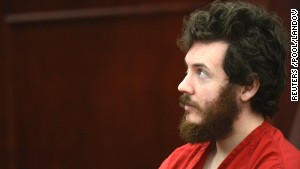 Death penalty sought for James Holmes
Death penalty sought for James Holmes  No plea deal in movie massacre
No plea deal in movie massacre  Moore: There will be another Aurora
Moore: There will be another Aurora The idea is to bring in 800 prospective jurors at a time on Thursdays and Fridays early next year, a process that McCallum says could take three to four weeks.
Those thousands will be winnowed down to 12 men and women for the start of the trial, which is set to begin February 3. It is expected to last four months.
Asking more people than usual to come to court for high-profile cases is common in the U.S. justice system, given concerns many of them already know the story and have strong opinions about it.
In Florida, for example, there was a 500-person jury pool for the now-ongoing murder trial of George Zimmerman, who is accused in the killing of teenager Trayvon Martin -- a case that drew national headlines for weeks.
So too, of course, did what happened just after midnight the night of July 20, 2012, in the Denver suburb of Aurora.
It was then and there, authorities say, that a man walked through an exit door into a crowded Theater 9 of the Century movie complex as a late-night premiere of the Batman sequel "The Dark Knight Rises" played.
The former neuroscience graduate student wore all-black, a ballistic helmet, a tactical ballistic vest, protective leggings, a throat and groin protector, and a gas mask, police say. And he carried an arsenal that included two Glock handguns, an AR-15 rifle, a shotgun and 6,295 rounds of ammunition, Bureau of Alcohol, Tobacco, Firearms and Explosives agent Steve Beggs has testified.
"He didn't care who he killed," prosecutor Karen Pearson told a judge during a preliminary court hearing in January, adding Holmes chose his venue carefully to cage his victims. "He intended to kill them all."
After the carnage and Holmes' subsequent capture outside the theater, he was charged with 166 counts of murder, attempted murder and weapons violations.
Since his arrest, much of the in-court discussion has resolved around Holmes' mental state.
Judge Samour earlier this month accepted the defense's plea of not guilty by reason of insanity. He was then taken to the Colorado Mental Health Institute in Pueblo for evaluation, and is expected to be back in Arapahoe County Jail on August 2.
Prosecutors in Arapahoe County announced in April they would seek the death penalty.
Despite the notoriety of the mass shooting, the judge ruled Thursday that the empaneled jury will not be sequestered, as Holmes' defense team requested. Making it so they couldn't go home throughout the prolonged trial, Samour said, was an "unnecessarily drastic, expensive and impractical remedy that ... will create an extreme and undue hardship for jurors."
The judge also ruled against the defense's attempt to prevent jurors from using phones or computers, barring their use in court but saying preventing them from using them outside is "unreasonable and unfair."
One thing jurors won't be able to see is restraints on Holmes.
As someone accused of "multiple violent crimes," Samour says that Holmes must be restrained carefully during his trial.
But the judge said he needn't wear handcuffs or shackles. Instead, the judge ruled, Holmes will "wear a harness under his clothing which will not be visible to the jury" and will be anchored to the floor.
Edith Windsor: Why I sued
Posted by Unknown
Editor's note: Edith Windsor was the plaintiff in the Supreme Court case challenging the Defense of Marriage Act.
(CNN) -- On Sunday, I will have the honor of serving as grand marshal in the New York City Pride Parade. I have marched in the parade for the last several years carrying a huge rainbow flag. Last year, I was so elated that I danced my way down the street for the entire route.
Before that, my late wife Thea and I, she in her wheelchair, would watch the parade together every year. If someone had told me 50 years ago that I would be the marshal of the New York City Gay Pride Parade in 2013 at the age of 84, I never would have believed it.
Over the past couple of years, many people have asked me, "Why did you decide to sue the United States over a tax bill?" Because the answer is complex, let me give you some of the background.
 Edie Windsor, right, talks to the press with her attorney Roberta Kaplan after the Supreme Court ruled against DOMA.
Edie Windsor, right, talks to the press with her attorney Roberta Kaplan after the Supreme Court ruled against DOMA. I lived with and loved my late spouse, Thea Spyer, for more than four decades in love and joy, and in sickness and health, until death did us part. When Thea died in 2009 from a heart condition two years after we were finally married, I was heartbroken.
On a deeply personal level, I felt distressed and anguished that in the eyes of my own government, the woman I had loved and cared for and shared my life with was not my legal spouse, but was considered to be a stranger with no relationship to me.
On a practical level, because of the so-called Defense of Marriage Act, or DOMA, I was taxed $363,000 in federal estate tax that I would not have had to pay if I had been married to a man named Theo instead of a woman named Thea. Even if I had just met Theo, married him and never even lived with him before he died, the tax would have been zero. So, overwhelmed with a sense of injustice and unfairness, I decided to file a lawsuit to get my money back.
 Windsor: We won everything we asked for
Windsor: We won everything we asked for  Did Supreme Court make history or not?
Did Supreme Court make history or not?  Watch the best moments from gay day
Watch the best moments from gay day I lucked out when Robbie Kaplan, a litigation partner at the law firm of Paul Weiss, walked into my life. At a time when the gay organizations that I approached responded with, "It's the wrong time for the movement," Robbie Kaplan said -- as did the Rev. Martin Luther King Jr. before her -- "There is no wrong time" to seek justice. She answered my plea, and took me on.
Robbie argued my case in the Supreme Court on March 27 this year. When she argued against DOMA, she was cool and calm and informed and reasoned -- all of which was sustained by her deeply felt passion for equality in all of our lives. And we WON -- all the way.
I have been so honored and humbled to represent not only the thousands of Americans whose lives have been adversely impacted by DOMA, but those whose hopes and dreams have been constricted by that same discriminatory law.
Because of the historic Supreme Court ruling in my case, the federal government can no longer discriminate against the marriages of gay and lesbian Americans. Children born today will grow up in a world without DOMA. And those same children who happen to be gay will be free to love and get married -- as Thea and I did -- but with the same federal benefits, protections and dignity as everyone else.
To all the gay people and their supporters who have cheered me on, thank you. I'm sure that Thea is thanking you, too.
Not only does a much larger portion of the "straight" world see us differently -- as just people who live and love and play with their kids -- but also our own community has come out and seen each other, and loved each other, in a way that makes me courageous and proud and joyous every day.
If I had to survive Thea, what a glorious way to do it.
Follow @CNNOpinion on Twitter.
Join us at Facebook/CNNOpinion.
Dead terrorist casts a spell
Posted by Unknown
Editor's note: Peter Bergen is CNN's national security analyst and a director at the New America Foundation. David Sterman is a graduate student at Georgetown University's National Security Studies Program.
(CNN) -- The U.S. drone strike that killed Anwar al-Awlaki, an American cleric who was born in New Mexico and who would go on to become an al-Qaeda leader in Yemen, did not silence his siren call to jihad.
That fact was underlined Thursday by the indictment against Dzhokhar Tsarnaev, who together with his brother, Tamerlan, allegedly carried out the deadly Boston Marathon bombing on April 15.
 Peter Bergen
Peter Bergen Some time before the Boston bombings, Dzhokhar downloaded a digital copy of a book for which Awlaki, who died in 2011, had written the foreword. The book directed Muslims not to give allegiance to countries such as the United States that have invaded Muslim lands.
Four days after the Boston bombings, surrounded by police and fearing death while hiding in a boat in Watertown, Massachusetts, Dzhokhar wrote messages that seemed to echo Awlaki's ideas such as "The U.S. government is killing our innocent civilians" and "We Muslims are one body; you hurt one, you hurt us all."
The Tsernaevs are only the tip of Awlaki's influence on American militants.
According to a count by the New America Foundation, 24 "homegrown" violent jihadist extremists in the United States who have been indicted or convicted of terrorism or have been killed while engaged in violent jihad since 2001 read Awlaki's propaganda or maintained contact with him.
 Tsarnaev indicted on 30 counts
Tsarnaev indicted on 30 counts This accounts for around one in five of all jihadist extremists indicted, convicted or killed since Awlaki's influence was cited for the first time in court documents in 2007, when his name turned up among the literature being read by members of a plot to attack the Ft. Dix military base in southern New Jersey.
From the grave, terrorist inspires a new generation
Awlaki first came to the attention of the FBI while he was living in San Diego where he had come into contact with two of the 9/11 hijackers in 2000. The FBI investigated those connections but was unable to discover if Awlaki had any nefarious connections to the hijackers.
Awlaki was working as an imam in Virginia in 2002. He then traveled to the United Kingdom and then to Yemen where his family was from.
In 2007, after a spell in a Yemeni jail that he blamed on the United States, Awlaki became more radicalized and he adopted an increasingly strident anti-American tone in his sermons, which were widely distributed on the Internet.
Soon Awlaki joined up with al Qaeda in the Arabian Peninsula.
His role at first was as a spiritual adviser. But he became more involved in operations over time. For instance, he played a central role in the recruitment of the Nigerian "underwear bomber" Umar Farouk Abdulmutallab, who tried to blow up Northwest Flight 253 over Detroit on Christmas Day 2009, court documents showed.
Since Awlaki's death in the 2011 drone strike, other militants have continued to be influenced by Awlaki's propaganda.
Quazi Nafis, a 21-year old Bangladeshi on a student visa, was arrested in 2012 for plotting to bomb the New York Federal Reserve. Nafis told a government informant that Awlaki's ideas had influenced him.
In December 2012, Randy Wilson and Mohammad Abukhdair were arrested in Georgia while attempting to travel to fight for al Shabaab, the al Qaeda affiliate in Somalia. According to the indictment Abukhdair provided an informant with compact discs containing lectures by Awlaki, and Wilson watched Awlaki's videos.
It is not surprising that Awlaki's influence has not disappeared following his death.
Awlaki's role in the radicalization of homegrown extremists was not primarily that of directing and facilitating operations. Only four U.S.-based extremists maintained contact with Awlaki rather than simply reading or watching his propaganda, according to the New America Foundation count.
Authorities say Army Maj. Nidal Malik Hasan, accused of murder in the 2009 Fort Hood, Texas, shooting spree that killed 13 people, communicated with Awlaki by e-mail prior to the attack. He also followed Awlaki's publications very closely.
However, a commission conducted after the attack to review the FBI's failure to prevent the shooting found no evidence that Awlaki directed Hasan's attack.
Awlaki also is said to have played an important role in the radicalization of Zachary Chesser, a Virginia resident who planned to join al Shabaab.
According to a report by the Senate Committee on Homeland Security, Chesser rapidly radicalized after his conversion to Islam in the summer of 2008 and was heavily influenced by Awlaki. Chesser began to post his writings on Awlaki's blog and began an e-mail correspondence with him, authorities have said.
Chesser decided to join al Shabaab's struggle in Somalia because of Awlaki's teachings on jihad, according to the congressional report. Chesser was arrested as he was about to fly to Africa from New York City in July 2010.
Looking to the future, the role of Awlaki's propaganda as a driver of homegrown extremism will largely be determined by whether the materials he produced before he died remain relevant and easily available on the many websites that distribute his lectures.
The Boston bombings remind us that at least as of now, Awlaki continues to exert his influence even from beyond the grave.
Follow us on Twitter @CNNOpinion.
Join us on Facebook/CNNOpinion.
Temper tantrums at Supreme Court
Posted by Unknown
Editor's note: Marshall Sonenshine was executive producer of the award-winning HBO film "The Loving Story" about the 1967 interracial marriage Supreme Court case of Loving v Virginia, a key precedent on which Windsor relies. He is a lawyer turned investment banker.
(CNN) -- Champions of equal protection had their day in court -- but it was a highly politicized day in the Supreme Court. Unlike the 1967 interracial marriage case of Loving v. Virginia, the gay rights decision in United States v. Windsor, while also a victory for civil rights, is not a moment of legal clarity or coherence. In court politicization, Windsor is closer to Bush v. Gore.
How cases end matters. The Loving case, at 9-0, was a victory for civil rights wrapped in a moment of Supreme clarity; 5-4 Windsor is a victory wrapped in a Supreme food fight.
Almost a half-century ago, Chief Justice Warren delivered a unanimous decision of the United States Supreme Court, invalidating state laws prohibiting interracial marriage. Sixteen states maintained such laws, including Virginia.
 Marshall Sonenshine
Marshall Sonenshine Loving invalidated laws banning interracial marriage. Windsor invalidated federal law denying benefits to homosexual couples married in states permitting same-sex marriage. A comparison of the two cases reveals how divided and divisive our court is today.
Richard and Mildred Loving were a mixed-race couple validly married in the District of Columbia, who upon returning home to Virginia faced continuing arrest and harassment by local police for violating Virginia's miscegenation laws.
After a decade-long cat-and-mouse game with the local authorities and a parallel odyssey through Virginia courts, the Lovings were vindicated when a unanimous Supreme Court held that state miscegenation laws were unconstitutional since they "rest solely on distinctions drawn according to race" and have "no legitimate overriding purposes independent of invidious racial discrimination which justifies this classification." The court held marriage to be among the "basic civil rights" that no state can infringe. Doctrine was born.
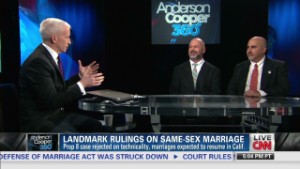 Sullivan: Incredibly long struggle
Sullivan: Incredibly long struggle  1 In 10 couples interracial
1 In 10 couples interracial Several years ago, the documentarian Nancy Buirski asked me to executive produce "The Loving Story," a documentary film chronicling a civil rights story and a love story. HBO co-produced the film. America loved Loving, with its legal and moral clarity. The film was a top performer at the 2011 New York Tribeca Film Festival. HBO began airing it on television on Valentine's Day 2012. This year the film won a Peabody.
Loving v. Virginia was notable for its coherence as the court's resolution of a legal odyssey. Today's legal culture includes conservative judges accusing jurists of partisanship at every turn, even the hardest cases. Call it Supreme Gridlock.
The dissent in Windsor excoriates the majority as "hungry" to grandstand in a case it claims was never properly before the court -- ignoring that Edith Windsor had won a judgment for an estate-tax refund that the U.S. government refused to honor unless the Supreme Court would invalidate the Defense of Marriage Act. Justice Antonin Scalia was wedded to his technicalities and indifferent to Ms. Windsor's equities.
The dissent slams the majority for "rootless and shifting" reasoning and claims the majority views DOMA's supporters as having "hateful hearts," a politicized barb at odds with the muted language with which the majority duly inspected the legislative purpose of DOMA.
Scalia is erudite but dead wrong in claiming, "In the majority's telling, this story is black and white. Hate your neighbors or come along with us." Come again? DOMA said the federal government could declare the validly married same-sex couple next door unqualified for any federal benefits extended to married heterosexual couples. And the court's majority is mongering hate?
Joining the politicized dissent is Justice Samuel Alito: "The family is an ancient and universal human institution" and "changes in family structure and in the popular understanding of marriage and the family can have profound effects." One struggles to rest much on these generalities. Similarly one would struggle to rely much on the broad intonations of the overruled state court judge in Loving:
"Almighty God created the races white, black, yellow, malay and red, and he placed them on separate continents. And, but for the interference with his arrangement, there would be no cause for such marriage. The fact that he separated the races shows that he did not intend for the races to mix."
The entire 1967 court could spot poppycock when it saw it. Chief Justice Earl Warren, concerned with precedent more than politics, probably nonetheless had to do some arm twisting to get unanimity, but he got it. In 2013, by contrast, a virulent dissent offers new polemics -- and then accuses the majority of being politicized.
Loving ended with legal and moral clarity. The New York Times headline read, "Justices Upset All Bans on Interracial Marriage, 9-0 Decision Rules." Windsor ended with, well, democracy still working its virulent ways, including at the court, whose members of its right flank were knitting angrily in their chambers. The dissent reaches for judicial temperament but unleashes judicial temper.
Perhaps it is time for a new documentary, "The Windsor Story." This one too will have a happy ending for the original petitioners, but this time told through the lens of Supreme Gridlock.
Follow us on Twitter @CNNOpinion.
Join us on Facebook/CNNOpinion.
Who's inspiring today's terrorists?
Posted by Unknown
Editor's note: Peter Bergen is CNN's national security analyst and a director at the New America Foundation. David Sterman is a graduate student at Georgetown University's National Security Studies Program.
(CNN) -- The U.S. drone strike that killed Anwar al-Awlaki, an American cleric who was born in New Mexico and who would go on to become an al-Qaeda leader in Yemen, did not silence his siren call to jihad.
That fact was underlined Thursday by the indictment against Dzhokhar Tsarnaev, who together with his brother, Tamerlan, allegedly carried out the deadly Boston Marathon bombing on April 15.
 Peter Bergen
Peter Bergen Some time before the Boston bombings, Dzhokhar downloaded a digital copy of a book for which Awlaki, who died in 2011, had written the foreword. The book directed Muslims not to give allegiance to countries such as the United States that have invaded Muslim lands.
Four days after the Boston bombings, surrounded by police and fearing death while hiding in a boat in Watertown, Massachusetts, Dzhokhar wrote messages that seemed to echo Awlaki's ideas such as "The U.S. government is killing our innocent civilians" and "We Muslims are one body; you hurt one, you hurt us all."
The Tsernaevs are only the tip of Awlaki's influence on American militants.
According to a count by the New America Foundation, 24 "homegrown" violent jihadist extremists in the United States who have been indicted or convicted of terrorism or have been killed while engaged in violent jihad since 2001 read Awlaki's propaganda or maintained contact with him.
 Tsarnaev indicted on 30 counts
Tsarnaev indicted on 30 counts This accounts for around one in five of all jihadist extremists indicted, convicted or killed since Awlaki's influence was cited for the first time in court documents in 2007, when his name turned up among the literature being read by members of a plot to attack the Ft. Dix military base in southern New Jersey.
From the grave, terrorist inspires a new generation
Awlaki first came to the attention of the FBI while he was living in San Diego where he had come into contact with two of the 9/11 hijackers in 2000. The FBI investigated those connections but was unable to discover if Awlaki had any nefarious connections to the hijackers.
Awlaki was working as an imam in Virginia in 2002. He then traveled to the United Kingdom and then to Yemen where his family was from.
In 2007, after a spell in a Yemeni jail that he blamed on the United States, Awlaki became more radicalized and he adopted an increasingly strident anti-American tone in his sermons, which were widely distributed on the Internet.
Soon Awlaki joined up with al Qaeda in the Arabian Peninsula.
His role at first was as a spiritual adviser. But he became more involved in operations over time. For instance, he played a central role in the recruitment of the Nigerian "underwear bomber" Umar Farouk Abdulmutallab, who tried to blow up Northwest Flight 253 over Detroit on Christmas Day 2009, court documents showed.
Since Awlaki's death in the 2011 drone strike, other militants have continued to be influenced by Awlaki's propaganda.
Quazi Nafis, a 21-year old Bangladeshi on a student visa, was arrested in 2012 for plotting to bomb the New York Federal Reserve. Nafis told a government informant that Awlaki's ideas had influenced him.
In December 2012, Randy Wilson and Mohammad Abukhdair were arrested in Georgia while attempting to travel to fight for al Shabaab, the al Qaeda affiliate in Somalia. According to the indictment Abukhdair provided an informant with compact discs containing lectures by Awlaki, and Wilson watched Awlaki's videos.
It is not surprising that Awlaki's influence has not disappeared following his death.
Awlaki's role in the radicalization of homegrown extremists was not primarily that of directing and facilitating operations. Only four U.S.-based extremists maintained contact with Awlaki rather than simply reading or watching his propaganda, according to the New America Foundation count.
Authorities say Army Maj. Nidal Malik Hasan, accused of murder in the 2009 Fort Hood, Texas, shooting spree that killed 13 people, communicated with Awlaki by e-mail prior to the attack. He also followed Awlaki's publications very closely.
However, a commission conducted after the attack to review the FBI's failure to prevent the shooting found no evidence that Awlaki directed Hasan's attack.
Awlaki also is said to have played an important role in the radicalization of Zachary Chesser, a Virginia resident who planned to join al Shabaab.
According to a report by the Senate Committee on Homeland Security, Chesser rapidly radicalized after his conversion to Islam in the summer of 2008 and was heavily influenced by Awlaki. Chesser began to post his writings on Awlaki's blog and began an e-mail correspondence with him, authorities have said.
Chesser decided to join al Shabaab's struggle in Somalia because of Awlaki's teachings on jihad, according to the congressional report. Chesser was arrested as he was about to fly to Africa from New York City in July 2010.
Looking to the future, the role of Awlaki's propaganda as a driver of homegrown extremism will largely be determined by whether the materials he produced before he died remain relevant and easily available on the many websites that distribute his lectures.
The Boston bombings remind us that at least as of now, Awlaki continues to exert his influence even from beyond the grave.
Follow us on Twitter @CNNOpinion.
Join us on Facebook/CNNOpinion.
If mom earns more, it's tough on dad
Posted by Unknown
Editor's note: Peggy Drexler is the author of "Our Fathers, Ourselves: Daughters, Fathers, and the Changing American Family" and "Raising Boys Without Men." She is an assistant professor of psychology at Weill Medical College of Cornell University and a former gender scholar at Stanford University. Join her on Facebook and follow her on Twitter @drpeggydrexler.
(CNN) -- A new study by Pew Research Center finds that, more and more, married mothers are earning more than their husbands -- about 23%, up from 4% in 1960. That's nearly one in four families. And although men say they support equality, they are struggling with this new reality.
Take Mina and Rich. They had been married for five years when Mina was appointed dean of admissions at an elite liberal arts college across the country. The couple decided that Rich, a busy attorney in private practice, would take some time off to stay home with their two children, who were 1 and 3, until they decided whether the new town, and her new job, would be a long-term fit.
The new arrangement worked out well, at least at the start. But a few months into her new job, Mina wondered if Rich was really as happy as he insisted he was. She wondered the same about herself.
Although Rich was home all day, he still often expected Mina to cook dinner. Laundry piled up. He hadn't made an effort to make friends or form any connections outside the house. "I began to worry about our marriage for the first time ever," Mina told me. "As if I'd forced some change on him. He'd become a different person."
 Peggy Drexler
Peggy Drexler Although most men say they support -- even welcome -- the idea of a dual income household and equality in marriage, evidence shows that men whose wives earn more may actually be suffering on a number of levels. And that although the social pressure that once discouraged women from working outside the home has given way, the pressure on husbands to be the primary earner remains.
Samantha and Andrei were both struggling artists when they met. But when they decided to start a family, at least one of them needed a full-time job. They decided it would be Samantha, who had sidelined in real estate for a few months after college. Turns out, she was very good at selling houses.
Although Samantha's job afforded Andrei the ability to continue with his art, he seemed to grow more discontent by the week. He began to see a therapist, who suggested that he try antidepressants.
"I kept having to tell myself that not having to go out and sell houses was a good thing," he told me. "It sounds horrible, in fact. I was not jealous of her at all. And yet, she was the reason we could afford to pay our mortgage, or go on vacation. She was the one who made life possible for our daughter. And that was hard to accept, even when I could recognize I was thankful I didn't have to make the sacrifices she was making."
 Moms increasingly becoming breadwinners
Moms increasingly becoming breadwinners  Women who are breadwinners face hurdles
Women who are breadwinners face hurdles  Moms increasingly becoming breadwinners
Moms increasingly becoming breadwinners Andrei's feelings are entirely common. In "Breadwinner Wives and the Men They Marry," Randi Minetor writes that many unemployed or under-earning men feel wounded by what they see as their diminished status. Their self-esteem can suffer. This can eventually lead to feelings of resentment toward their spouse — sometimes conscious, but often unconscious — even if a guy has purposely opted to stay home, take time off, or willingly embark on a less fruitful career.
A recent study of more than 200,000 men conducted by Washington University's Olin Business School and published in the Personality and Social Psychology Bulletin found that men whose wives are the primary earner are about 10% more likely to require medication to combat such issues as insomnia, anxiety and erectile dysfunction.
Research conducted at Cornell and presented at the annual meeting of the American Sociological Association, meanwhile, found that men who earn significantly less than their female partners are five times more likely to cheat than those in relationships where incomes are more comparable.
But the answer, of course, isn't for women to revert to their traditional roles of cooking, cleaning and tending to the children while the man of the house is off bringing home the bacon. As more and more women rise to powerful positions in the workplace, the incidence of female breadwinners will continue to grow.
Husbands of these wives who may be experiencing feelings of depression and low self-esteem would be wise to have an honest conversation with their spouse, and themselves, to find out what's really bothering them. Oftentimes, it may not be the fact that their spouse earns more, but that their spouse may have less time to spend at home, or may be neglecting other areas of the relationship.
For those men who are considering following a less career-oriented path, it's important for the couple to make a decision together. Neither member of the couple should feel as if they were forced into a decision, or "trapped."
Keeping dialogue open between partners helps reinforce the fact that although the man is not working, or is earning less, he is still an equal partner. In the case of stay-at-home fathers, it's important for men to counter any issues of isolation and boredom by making sure they maintain friendships and interests outside the house.
Eventually, through hours and hours of conversations with Mina and many ups and downs at home, Rich came to not only accept his role as stay-at-home dad, and the lesser earner, but also to enjoy the opportunities it afforded him.
He was able to coach their son's soccer team, and he never missed a ballet recital. Once the kids began school, he reopened his private law practice part-time, taking only those cases that truly interested him. "I'd been worried he was becoming a different person, and he did become one," Mina told me. "But turns out different was better. At least for us."
Follow us on Twitter @CNNOpinion.
Join us on Facebook/CNNOpinion.